Victory Stride celebration, reflection of civil rights
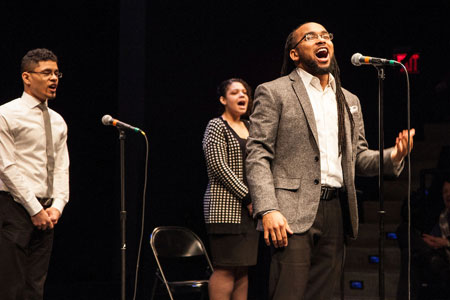
Rashad McPherson and Divine Purpose performed two gospel songs at the Victory Stride event at the Semel Theater February 26, including “We Shall Overcome.” (Photo by Kelsey Davis ’14)
An energetic Roger House sprinted to the microphone at the beginning of Emerson’s well-attended Victory Stride event February 26 and declared, “I’m excited because I woke up today with a feeling of freedom.”
The associate professor of history in the Journalism Department was the key organizer of the event, held at the Semel Theater, which marked Emerson’s recognition of 60 years of civil rights progress. Comedian Jimmy Tingle; Camille Nelson, the first African-American dean of Suffolk University Law School; and other prominent community leaders and artists spoke or performed.
Carole Simpson, the emcee, strode onto the stage dressed in 1960s garb while singing, “This Little Light of Mine.”
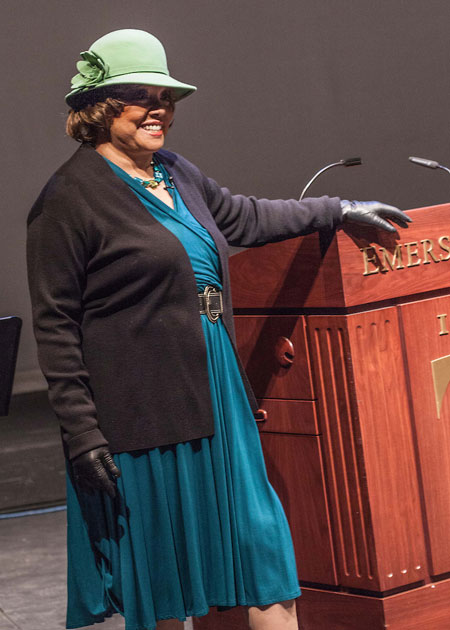
Dressed as a 1960s civil rights marcher, Carole Simpson, senior leader-in-residence for the Journalism Department, emceed the Victory Stride event February 26 at the Semel Theater. (Photo by Kelsey Davis ’14)
“I have come dressed as a woman civil rights marcher,” said Simpson, the Journalism senior leader-in-residence. “I want to talk about the demonstrators—the unsung heroes and heroines.”
Simpson, a former ABC News anchor, recalled covering the civil rights movement.
“[Dr. Martin Luther King Jr.] was very particular about how his demonstrators looked,” she said. “He wanted the men in their Sunday clothes, and he wanted the women dressed in dresses and hats, purses and gloves.”
“He wanted the white mobs to see that these were good people,” Simpson said.
Simpson and Emerson President Lee Pelton, who also addressed the audience, said the civil rights movement had a tremendous positive impact on them as African-Americans.
“I stand on their shoulders,” Simpson said. “They strode to victory.”
Pelton, who said the civil rights movement “brought about more change than many of us could have imagined,” recounted its early struggles.
“In 1954, when the Supreme Court ruled in Brown v. Topeka Board of Education that segregated schools were unconstitutional,” he said, “I was a 4-year-old African-American kid from a working class family in Wichita, Kansas.”
His parents, who were laborers, decided to send Pelton to a predominantly white school.
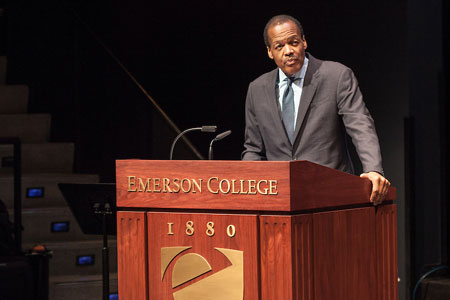
President Lee Pelton speaks at Victory Stride. (Photo by Kelsey Davis ’14)
“This was an easy decision then,” he said. “Rather than attend the segregated African-American school several miles to the south, I could attend the white school three blocks to the north. [It had] better facilities and fewer students per classroom.”
“My best friend in elementary school was a white boy who lived in the … neighborhood,” Pelton continued. “Though we walked to school together, I was never allowed by his parents to set foot inside his house.”
Tingle, a political humorist born and raised in Cambridge, reflected on being “extremely homophobic” while growing up.
“Is anybody in here homophobic?” Tingle jokingly asked the crowd. “No, Jim. You’re at a civil rights rally. Only you, Jim.”
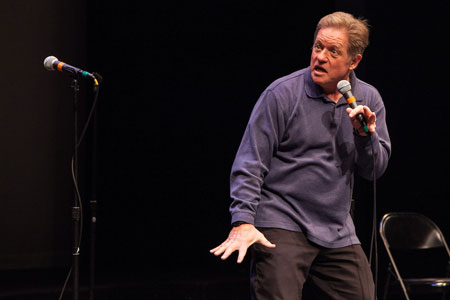
Political humorist Jimmy Tingle at Victory Stride. (Photo by Kelsey Davis ’14)
“I grew up in a neighborhood where you could be considered gay for anything,” he said. “The slightest deviation from the norm: ‘You got a haircut? What are ya, gay? You didn’t get a haircut. What are ya, gay?’”
“Any kind of prejudice is based in fear,” he said.
While Tingle criticized the lingering rule that homosexuals cannot march in South Boston’s St. Patrick’s Day Parade in the funniest terms possible, he called it “amazing” that gay marriage has been legalized in 17 states.
“That’s what makes me optimistic about the country and the future,” he said.
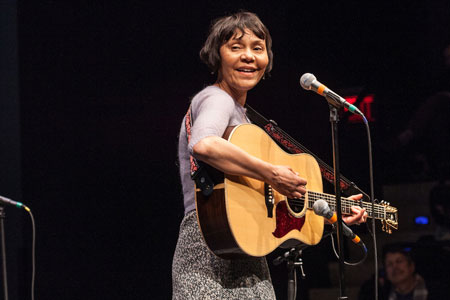
Folk musician Thea Hopkins at Victory Stride. (Photo by Kelsey Davis ’14)
Pelton, too, expressed optimism, while reflecting on the 50th anniversary of the Civil Rights Act and the 60th anniversary of Brown v. Board of Education.
“I learned many lessons—not all of which the court probably had in mind when it desegregated the nation’s public schools,” Pelton said. “I learned from an early age what it means to be the only dark face in a sea of white faces.
“Mostly, I learned to always seek out the best, rather than the worst in humankind,” he said. “I learned the importance of seeking out work of noble note and finding meaning in my commitment to others.”
Other speakers included: Jonathan Miller, civil rights division chief in the Massachusetts Attorney General’s Office, who spoke about his work; Marlene Kim, economic professor at University of Massachusetts Boston, who spoke about equal employment issues; and Frank Rudy Cooper, professor at Suffolk, who spoke about gender inequality.
Artistic performances were conducted by: Rashad McPherson and Divine Purpose (gospel choir); Thea Hopkins (folk musician); Sam Dechenne (trumpet player); Professor Lyrical (rap artist); Janae Johnson (slam poet); and Alexi Paraschos (vocalist).
Categories